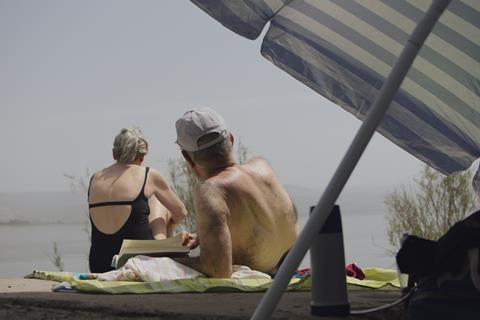Palestinians banned from growing the herb za’atar defy the laws in this artful, but very piquantly spiced documentary.

Dir. Jumana Manna. Palestine. 2022. 65 mins.
Za’atar is a herb often used as an ingredient in Arab bread recipes, and so closely associated with Middle Eastern cuisine that, according to one person quoted in Jumana Manna’s Foragers, it could be considered “the national food of the Arabs”. Along with other herbs of the region, it is also a hotly contested commodity; the political struggle over who gets to control such foodstuffs and call them their own is the subject of this imposing hybrid documentary by Palestinian artist, sculptor and filmmaker Manna, which competes in Visions du Réel after appearing as an installation at Berkeley’s BAMPFA. Despite its brevity, and a knowingly light touch, there is no disguising the furious polemical thrust of this engaging, visually elegant piece. The 65-minute running time will limit its exposure, but festivals and platforms will appreciate its distinctive, very human take on the Palestinian-Israeli conflict, seen here in an unaccustomed light.
Za’atar is so firmly rooted in the Arab cultural landscape that those who are passionate about this herb won’t give up their beloved foraging habits too easily
Merging documentary material with performed sequences, the film begins with a man hiding out in a lush natural landscape, then puncturing the tyres of an Israeli parks control vehicle. We then see a crackly video clip of a 1970s TV item, showing how the harvesting of za’atar – known to some by the biblical name ‘hyssop’ – is being strictly controlled in Israel, and outlawed for Palestinians, with Israeli interviewees priding themselves on their smarts for selling za’atar to the Arabs.
The official reason for forbidding foraging of this and other local herbs – including louf, shomar and the thorny sunflower relative akkoub - is that these plants are in danger of extinction. But the way that Manna and her cinematographers shoot the film’s lush green vistas - in Galilee, Tiberias, Golan Heights and the Jerusalem region - suggests that the prospect of a shortage is contentious. Whatever the case, Manna’s point is that Israel’s powers that be – including the Israeli Nature and Parks Authority – are keeping these herbs from the Palestinian population as a method of control.
Nevertheless, za’atar and others are so firmly rooted in the Arab cultural landscape that those who are passionate about these herbs won’t give up their beloved foraging habits too easily. Manna presents us with a range of herb gatherers, who glean the plants for essential culinary reasons, or recreation, or both. Among them are an elderly couple, Aziza and Adel - played by the director’s own parents – who are seen walking in the hills and relaxing by a lakeside. We also meet hardy veteran Zeidan Hajib, out on foraging excursions trips with his several beloved labradors; his devotion to foraging can’t help recalling the committed, eccentric subjects of recent Italian-set documentary The Truffle Hunters. We also meet the elderly, fiercely determined Mr Samir, who insists, “I’ll continue the path of my grandparents” - even (or especially) when faced with a substantial fine or 30 days in prison.
Manna also shows a number of interrogations of arrested foragers, with the Israeli authorities clearly meaning business. These sequences are scripted, but beyond the formal shooting style, they feel absolutely natural, with a ring of plausibility. Keeping the questioning authorities off-screen, Manna shows us a mixture of some people playing named roles, others seemingly playing themselves, as per end credits.
The film teaches us a fair amount about Middle Eastern botany and cuisine, and the social customs around both. But what is always beneath it is an argument about social control and cultural appropriation, in an absolutely concrete sense: the idea that Manna’s subjects are now expected to buy their traditional herbs from officially designated sources, like the kibbutz where Manna interviews a clearly uncomfortable akkoub plantation manager.
Manna’s credentials as a visual artist are manifestly clear in fixed-camera landscape shots that fill the screen, while allowing us to watch people wandering in the distance and to clearly pick out other moving and static details. The same goes for an imposing aerial opening shot, and a final panorama that makes clear the foraging law’s wider historical stakes for Palestinians. Close-ups, meanwhile, plunge us right into the natural vegetation. Similarly, a night shot, with the landscape lit by a passing car, is accompanied by Rashad Becker’s dense sound design, laden with crickets and other night creatures. Becker’s unusual, rhythmically inventive score, taking in organ, bells and taut plucked strings, heightens the flavouring of a film that is spiced artfully, but very piquantly.
Production company/international sales: Jumana Manna, jumana.manna@gmail.com
Producer: Jumana Manna
Screenplay: Jumana Manna, Rabieh Ebgarieh
Cinematography: Marte Vold, Ashraf Dowani, Yaniv Linton
Editing: Jumanna Manna, Katrin Ebersohn
Music: Rashad Becker
Main cast: Aziza Manna, Adel Manna, Zeidan Hajib















![[L-R]: Amanda Villavieja, Laia Casanovas, Yasmina Praderas](https://d1nslcd7m2225b.cloudfront.net/Pictures/274x183/6/4/1/1471641_pxl_20251224_103354743_618426_crop.jpg)








